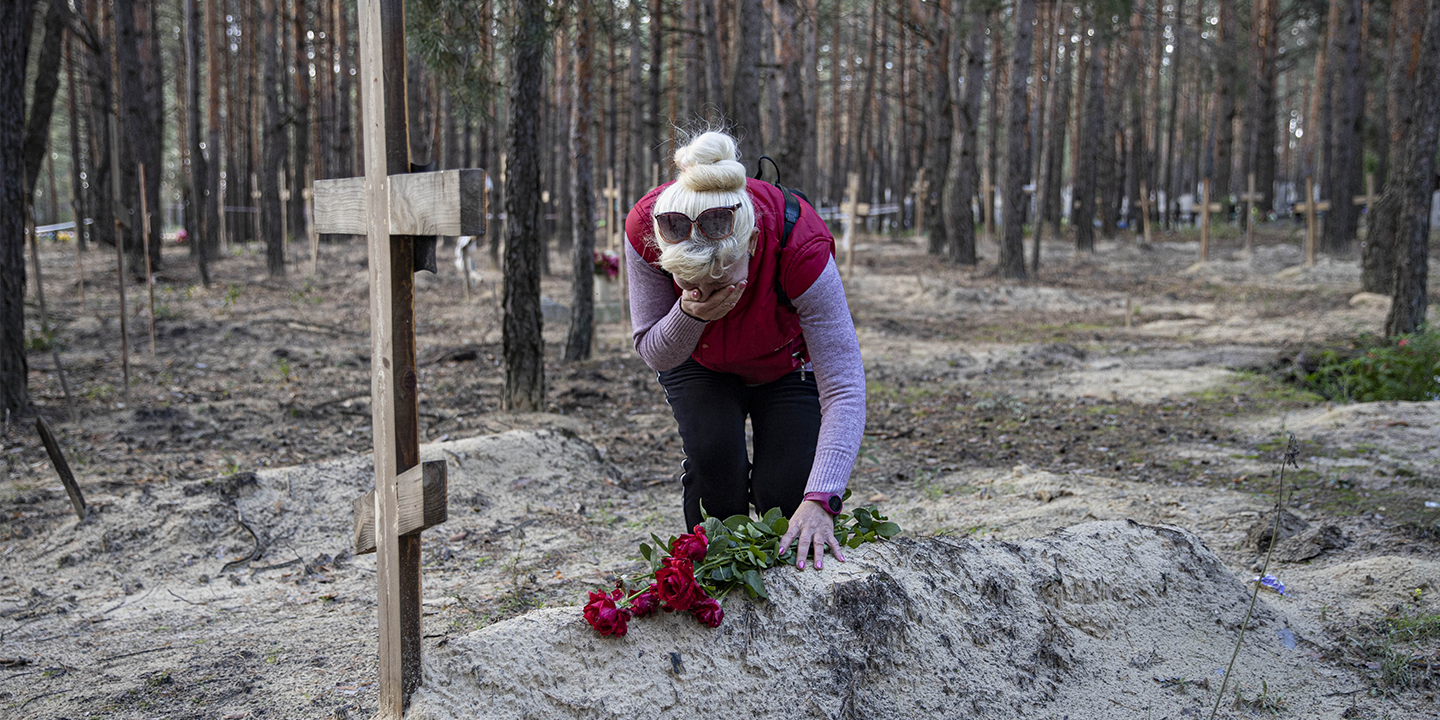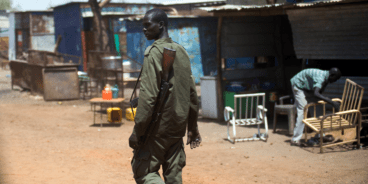

Atrocity Alert No. 318: Ukraine, Syria and the Global Network of R2P Focal Points
Atrocity Alert is a weekly publication by the Global Centre for the Responsibility to Protect highlighting situations where populations are at risk of, or are enduring, mass atrocity crimes.
MASS GRAVES DISCOVERED IN IZIUM, UKRAINE
On 15 September multiple mass burial sites were discovered outside of the city of Izium, near Kharkiv in eastern Ukraine. The graves were found in the forest outside the city in areas recently retaken by the Ukrainian government after 5 months of occupation by Russian forces. Ukrainian authorities estimate at least 445 people, including children, are buried at the sites, having so far exhumed almost 150 bodies without coffins.
Preliminary findings shed light on how those buried were killed. One mass grave contained the bodies of 17 Ukrainian soldiers, some of whom were tortured and buried with their hands tied. Many of the dead appear to be civilians, with some bearing telltale signs of torture while dozens of others were killed in the shelling of an apartment building. Indiscriminate attacks on civilian infrastructure as well as torture of combatants and civilians are violations of international law that may amount to war crimes or crimes against humanity.
The graves discovered in Izium follow a pattern of abuse perpetrated by Russian forces while occupying Ukrainian territory. Over 400 bodies were discovered in April in the town of Bucha, outside Kyiv, after Russian forces retreated from the area. Hundreds more were discovered in the surrounding areas, with 95 percent of those killed found to be fatally shot. Similar atrocities took place in and around the southern coastal city of Mariupol, which was besieged for weeks before being taken over by Russian forces in May. While the city still remains under Russian occupation, ousted local authorities claim thousands of people are buried outside the city in a mass grave, which satellite technology documents to be approximately 340 meters, larger than three football fields.
Speaking on the grim discovery, Ukrainian President Volodymyr Zelensky said, “Bucha, Mariupol, now, unfortunately, Izium. Russia leaves death everywhere. And it must be held accountable for it.”
As Ukrainian forces continue to retake territory in the country’s east and south, Russian-installed and supportive government officials in occupied territory in the Luhansk, Donetsk, Kherson and and Zaporizhzhia regions have scheduled referendums to “join Russia” to take place between 23-27 September. On Wednesday, 21 September, Russian President Vladimir Putin announced the partial mobilization of Russia’s military reserves to bolster its positions in Ukraine and welcomed the planned referendums.
As the conflict continues, parties must take all measures possible to protect civilians in frontline areas. All allegations of war crimes and crimes against humanity must be investigated and the perpetrators held accountable, regardless of rank or affiliation.
UN COMMISSION REPORTS ONGOING ATROCITIES AND WARNS OF ESCALATION IN SYRIA
The UN Human Rights Council-mandated Commission of Inquiry on Syria (CoI) released a report on 14 September, documenting continued grave violations of international human rights and humanitarian law across Syria, many of which amount to likely war crimes and crimes against humanity. In a press release regarding the report, the Chair of the CoI, Paulo Pinheiro said that, “Syrians face increasing and intolerable hardships, living among the ruins of this lengthy conflict… Syria cannot afford a return to larger-scale fighting, but that is where it may be heading.”
During the reporting period – from 1 January to 30 June 2022 – the CoI documented attacks across northwest Syria that resulted in the killing of dozens of civilians and destruction of civilian objects, including homes, schools, mosques, medical facilities and objects indispensable to the survival of the population, such as a water station serving over 200,000 people. Noting the consequences of fighting in Idlib, Aleppo and elsewhere, the CoI asserted that, “families living in front-line areas have borne the brunt of pro-government forces’ ground-to-ground shelling in these areas, with… children killed on their way to school, men killed as they tended to their shops, and an entire family killed as they gathered outside their home for afternoon tea.”
The Commissioners warned of a possible return to large-scale and deadly violence in Syria, given the threat of another Turkish ground operation in the northeast and ongoing fighting between Turkish-backed and Kurdish-led forces.
The CoI also reported that across government-controlled areas in the central, west and southwest of Syria, arbitrary arrests, disappearances and ill-treatment continue to be perpetrated on a systematic basis. The report calls on UN member states to create an international and independent mechanism to coordinate and consolidate claims regarding missing and disappeared persons and to help clarify their fate. Such a mechanism has long been advocated for by the CoI, as well as Syrian and international civil society organizations. In August the UN Secretary-General released a study recommending that the General Assembly establish a mechanism dedicated to clarifying the fate and whereabouts of missing persons in Syria, as well as supporting victims, survivors and their families.
The protracted crisis in Syria demands increased international attention, not less. UN member states should urgently work toward the establishment of an independent international mechanism to clarify the fate and whereabouts of those missing and disappeared in Syria as recommended by the CoI and the Secretary-General, as well as continue to pursue accountability for alleged perpetrators of atrocities under universal jurisdiction.
10TH ANNUAL MEETING OF THE GLOBAL NETWORK OF R2P FOCAL POINTS
The Global Network of R2P Focal Points held its 10th annual meeting on 15-16 September in Washington, D.C. The meeting, hosted by the Global Centre for the Responsibility to Protect at the headquarters of the Organization of American States (OAS), brought together senior officials from governments and regional organizations, the UN Special Adviser on the Responsibility to Protect, and members of civil society. While opening the meeting, OAS Secretary General, Luis Almagro Lemes, reiterated his organization’s support for implementation of R2P because “the failure to act, the failure to prevent in the face of atrocities has resulted in the most devastating and avoidable tragedies of our lifetime.”
The 10th annual meeting featured sessions on how regional organizations can be an important tool in preventing and responding to mass atrocities, on bridging the gap between R2P and the Women, Peace and Security agenda – as well as wider consideration of the gender lens within atrocity prevention – and on the role civil society actors can play in enabling governments to protect populations more effectively.
Participants shared insights from their own governments and organizations on how to prioritize atrocity prevention, including highlighting the OAS’ newly-launched report entitled, “The Responsibility to Protect and the Organization of American States: A Path Forward for Atrocity Prevention and Response in the Americas” and the United States’ “Strategy to Anticipate, Prevent, and Respond to Atrocities.” While introducing the strategy, H.E. Uzra Zeya, United States Under Secretary for Civilian Security, Democracy, and Human Rights, asserted that, “the United States refuses to accept that atrocities and human rights abuses are beyond global partners’ power to prevent and counteract, and we believe justice is both possible and incredibly necessary. We can do better. The world can do better.”
During the meeting R2P Focal Points heard shared perspectives from affected communities and representatives of survivor groups, including moving reflections regarding ongoing threats to populations and missed opportunities for prevention in Ukraine, Myanmar and Venezuela from the Ambassador of Ukraine to the United States, H.E. Oksana Markarova, the Executive Director of Centro de Justicia y Paz (CEPAZ), Beatriz Borges, and the Founder and Executive Director of the Women’s Peace Network, Wai Wai Nu. During working sessions participants heard recommendations on how to prevent further crimes, including efforts launched to ensure accountability for perpetrators of atrocities in Ukraine, renewing the mandate of the Fact-Finding Mission on Venezuela during the current Human Rights Council session, and adopting a resolution on Myanmar in the UN Security Council.
R2P Focal Points are senior government officials who aim to promote R2P and atrocity prevention at the national, regional and international level. The Global Network of R2P Focal Points was launched in September 2010 on the sidelines of the UN General Assembly and the Global Centre for R2P serves as its Secretariat. More than 60 governments and two regional organizations have joined the network.
Related Content


11th Meeting of the Global Network of R2P Focal Points Outcome Document
